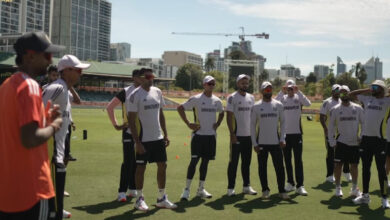Caste slurs, missing father’s funeral, going for broke: Vandana Katariya sets 300th game record today | Hockey News

GROWING UP in Haridwar, Vandana Katariya was mocked for playing hockey. When she ignored the noise around her, broke stereotypes and became a trailblazer in the sport of her choice, she was subjected to caste slurs.On Tuesday, Vandana will reach a milestone that no other woman player in the country has achieved before — make 300 international appearances.
The landmark moment will arrive when Vandana takes the field against Japan at the Asian Champions Trophy here.
On the eve of the match, Vandana was at ease. After the training session where the 31-year-old matches the national team’s youngsters Sangita Kumari and Lalremsiami, she quips: “Oh! Mujhe spotlight nahi chahiye (I don’t want to be in the spotlight).”
But the spotlight will well and truly be on her Tuesday evening. “When I started, I didn’t think I would be playing for India. I didn’t even know that was an option, and I certainly didn’t think I would be playing 300 matches,” Vandana says. Her career will come full circle as Vandana made her international debut back in September 2011 at the same tournament in Ordos, China.
Vandana didn’t have it easy. While her father Nahar Singh backed her, there used to be taunts from neighbours, among which was about a girl child being allowed to play a sport that required her to wear shorts. After initial apprehensions, her father ensured she continued to play at coach Krishna Kumar’s academy in Roshanabad.
“Earlier, people came and told my family some things and I used to wonder why I was born a girl. But I always believed that society should change,” Vandana says. “Something should happen that would help girls come out and do things. So I just kept training and today there are more than 250 kids who play hockey in our village, of which most are girls. It feels good when they come to meet me and speak to me about my training and other aspects.”
Former head coach Sjoerd Marijne, who oversaw the Indian women’s team’s famous campaign in Tokyo where they finished fourth, said that when he met Vandana for the first time, her fitness levels were incredible and she was a forward who just wanted to “score, score, score”.
“She runs the same in the Yo-Yo test as some of the men,” says Marijne. “At the beginning of my stint, she was very focused on scoring herself, then I tried to give her insights into how she could keep scoring more but also be busy with the team. She’s a striker and there is nothing wrong with being focused on scoring goals for herself.”
“And she was always open-minded and her mindset changed focusing more on teamwork. Before the Olympics, I told her ‘you have to be the energy-maker for the team’. She went on to be the leading scorer for the team,” the Dutchman adds.
Over the years, Vandana has evolved into a mentor for the youngsters in the team. “Van sets a great example,” says current head coach Janneke Schopman. “She helps them with maintaining fitness, which is important in terms of the work you have to do on and off the field. She is always giving them tips and teaching them tricks on being a striker, and how to get ready for a big game. She is a natural at it.”
In her decade-plus-long career, Vandana has been a part of teams that have taken women’s hockey to new heights. But her biggest moment came at the Tokyo Olympics two years ago, where her hat-trick against South Africa – the first-ever an Indian woman at the Olympics – took the team to the quarterfinals.
India then stunned one of the favourites, Australia, to reach the semifinals and eventually finished fourth. That Tokyo Olympics campaign often finds a mention in the conversation with Vandana as she calls it the highlight of her career alongside the bronze at the 2013 Junior World Cup.
It was while she was in Tokyo when Vandana’s family got the attention they could have done without. After India’s defeat against Argentina in the semifinals, three men landed at her home and insulted the family members. Her brother, speaking to The Indian Express, had said: “The youths said how can people of my caste play in the national team? Our family is in a state of fear because they also threatened to kill us.”Most Read
1
Cricket World Cup: Jasprit Bumrah & Mohammed Shami add their name to elite l of fast-bowling twins
2
Bengaluru: After missing multiple deadlines, Japanese tech-backed adaptive signals to be commissioned December-end
See More
But the worst phase of her career was before Tokyo when her father passed away and she couldn’t attend the funeral because she was inside the bio-bubble at the camp in Bengaluru.
She recalls being broken back then. “Even standing up felt difficult,” Vandana says. “Many of the home responsibilities fell on me. To face all that back then, the support of the team was huge. They lifted me.”
“I thought then that I would not be able to play anymore. But there was the Olympic Games in front of us, the team was working so hard. And if I was not able to do it for the team, all of them would have been affected. The team didn’t let me feel lonely even for a second. It is only because of my teammates and coaches that I am here.”




